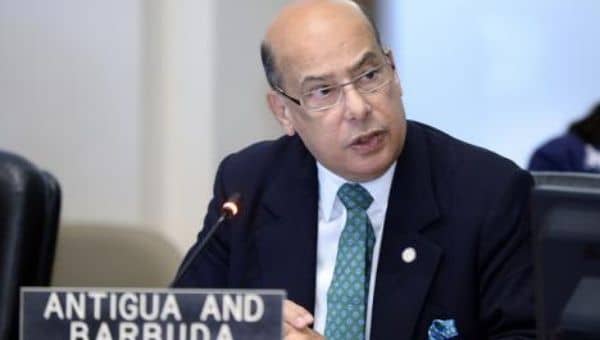

By Sir Ronald Sanders
The governments of the world’s powerful nations have learned to live with disregard for human suffering. That is the bleak truth behind a new UN report whose numbers should shame every leader or diplomatic representative who speaks of global responsibility. According to the World Food Programme, ending hunger by 2030 would cost just US$93 billion a year—less than one per cent of the US$21.9 trillion that nations have poured into their militaries over the past decade.
Yet instead of falling, hunger is escalating. By 2026, 318 million people will face crisis-level hunger or worse. That is double the number seven years ago in 2019.
In wealthy nations, hunger is practically invisible. It is confined to small pockets easily managed. Citizens enjoy abundant supermarkets, stable food prices, and the luxury of never imagining what a mother feels when she cannot feed her child. But elsewhere in the world the poorest are paying dearly for wars, promoted either by local rivalry for power, or external ambition for control.

Nowhere is this clearer than Gaza. Despite the diplomatic fanfare surrounding a “ceasefire”, children continue to starve. At least 13 people were killed in drone attacks last Wednesday. Two years of Israeli bombardment, blockade, and forced displacement have exhausted families. UNICEF reports children sleeping in flooded tents, without warm clothing or dry bedding, immune systems shattered by years of malnutrition and trauma. High-energy biscuits—usually the last resort in humanitarian crises—now pass for sustenance.
Israeli forces still restrict access to over half the enclave, and even with new border openings, the flow of food and medicine is painfully inadequate. Winter rains turned makeshift shelters into shallow lakes. Parents, already broken by grief, now watch their children tremble through the cold. These images have disappeared from the coverage of television stations in most rich nations.
But if suffering in Gaza is hardly mentioned in the mass media of rich nations, Sudan and the Democratic Republic of Congo are almost completely ignored. Yet, in Sudan, the situation is grim. Twenty-one million people, nearly half the population, do not have enough to eat. The message is clear – war starves.
In eastern Democratic Republic of Congo, more than 25 million people are now hungry. Violence has destroyed farms, displaced millions, and turned rich agricultural lands into wastelands. For these families, hunger is now permanent.

In the Caribbean, hunger is mercifully rare—except in Haiti, where armed gangs now dominate much of the country. Violence has turned roads into killing grounds; markets remain shut; farmers abandon their fields. The result is predictable: rising hunger in a land already scarred by earthquakes, political instability, and economic collapse. Here, too, conflict is the chief architect of misery. The attempts to address the problem has been met with division in the U.N. Security Council. In the Organization of American States an ambitious road map laid out by the Secretary-General, Albert Ramin, is yet to garner the support it needs. Meanwhile, the Haitian people suffer – the victims of gangs, and political gamesmanship with Haiti and by external players.
Thankfully, beyond Haiti, Latin America and the Caribbean tell a more hopeful story. Hunger declined for a second consecutive year in 2023, falling to about 41 million people—roughly 6.2 per cent of the region’s population—nearly three million fewer than the year before. Food insecurity dropped below the global average for the first time in a decade, thanks to economic recoveries, social protection programmes, and targeted efforts to improve food access.
But this is not yet cause for celebration. The region is now the second-most exposed in the world to extreme weather, after Asia. Droughts, powerful hurricanes, unpredictable rainfall, and shifting seasons are already increasing hunger by 1.5 percentage points in the most climate-affected countries. Jamaica, after Melissa, can attest that Climate change is real and is relentless.
The world tends to imagine hunger as localised suffering. It is not. Hunger is a contagion carried through global markets, supply chains, trade flows, and political shocks. No country is immune. The war in Ukraine proved this with brutal clarity: grain exports stalled, prices spiked, and food riots broke out across the globe. When global food prices rise, social unrest follows—a documented pattern across continents. The Food and Agricultural Organization warns that when families cannot eat, “social contracts weaken.” The international system has never been more interconnected, nor more fragile.
UN agencies, such as the World Food Programme and the UN Human Rights Office, are the first responders in these human tragedies. They work in mud, under fire, amid collapsing states. They do so with chronic underfunding, exposed by lack of adequate protection, and often unnoticed by the world they serve. They are the best expression of multilateralism.
But their heroism casts an even harsher light on the UN Security Council’s failures. Conflict is now the primary driver of the world’s worst hunger crises, yet the Security Council still treats hunger as a humanitarian footnote—not a geopolitical threat.
What is missing is not expertise or capacity—it is political will and the allocation of resources. Ending hunger by 2030 would cost less than one per cent of what has been spent on militaries over the last decade. The idea that the international community can find US$21.9 trillion for weapons but cannot mobilise US$93 billion a year to prevent starvation exposes the gap between its stated values and its actual priorities.
The world must stop treating hunger as a humanitarian calamity that will always exist and recognise it as a preventable consequence of political decisions. As UN Deputy Secretary-General Amina Mohammed told the Security Council, “there can be neither peace where people are starving, nor security where hunger drives conflict.” That is a warning that should not be ignored.
(The author is the Ambassador of Antigua and Barbuda to the United States and the OAS, and Dean of the OAS Ambassadors accredited to the OAS. Responses and previous commentaries: www.sirronaldsanders.com)
Advertise with the mоѕt vіѕіtеd nеwѕ ѕіtе іn Antigua!
We offer fully customizable and flexible digital marketing packages.
Contact us at [email protected]














Information from Gaza is governed by Hamas. Hamas doesn’t tell the truth. Plus, a report released about 2 years ago showed that Hamas leaders became billionaires from international aid. Instead of building bomb shelters for their people during the regular wars with Israel, they deliberately put civilians in harm’s way and make no effort to protect. them.
https://www.nbcnews.com/news/world/gaza-plagued-poverty-hamas-no-shortage-cash-come-rcna121099
https://thearabweekly.com/hamas-leaders-seen-living-luxury-while-gazans-suffer
Comments are closed.